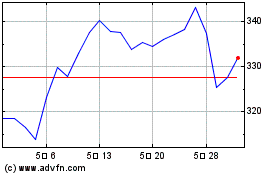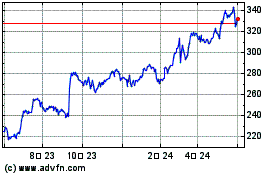Form PX14A6G - Notice of exempt solicitation submitted by non-management
02 8월 2024 - 4:50AM
Edgar (US Regulatory)
United States
Securities and Exchange Commission
Washington, DC 20549
Notice
of Exempt Solicitation
CASEY’S GENERAL
STORES
| 2. | Name of person relying on exemption: |
THE ACCOUNTABILITY
BOARD, INC.
| 3. | Address of person relying on exemption: |
401 Edgewater Pl #600, Wakefield, MA 01880
The attached written materials are submitted pursuant to
a voluntary application of Rule 14a-6(g)(1) promulgated under the Securities Exchange Act of 1934. Submission is not required of this
filer under the terms of the Rule but is made in the interest of public disclosure and consideration of these important issues.

August 1, 2024
Dear fellow shareholders,
For years, Casey’s touted the independence
of its previous board chair, even referring to it as a “best practice” of its corporate governance. Yet without providing
a detailed explanation for its decision, last year the board elected the company’s CEO to serve as its chair.
Citing a broad consensus of the corporate world
about the range of harms posed by such a governance structure, we filed a shareholder proposal (Proposal 4 in the proxy statement) requesting
an independent chair policy. But the CEO-led board opposes our proposal, not by attempting to reconcile its previous “best practice”
positions about the board chair, nor by explaining the rationale behind a weakened governance structure that combined the CEO and chair,
but simply by noting that it hasn’t set a fixed policy about combining the roles and arguing for its own flexibility in deciding
the issue whenever it arises.
But such undefined “flexibility” is
a poor structural foundation on which to build strong corporate governance that assures effective management and equally effective board
supervision. As ISS so discerningly articulated, an independent chair is ideal in order “to help provide appropriate counterbalance
to executive management.”
Glass Lewis observes that “shareholders
are better served when the board is led by an independent chair, a role which we believe is better able to oversee the executives of the
Company and set a pro-shareholder agenda without the management conflicts that exist when a CEO or other executive also serves as chair.
This, in turn, leads to a more proactive and effective board of directors.”
We agree with these fundamental insights on sound
corporate governance and so we’ve filed a proposal to establish them with an independent chair policy.
Finally, we note an example of the problems that
arise when independence between senior management and the board chair is eliminated. In its opposition statement, the CEO-led board of
Casey’s includes a section titled, “Company Performance has been Exceptional Since Mr. Rebelez was Appointed as Board Chair,”
which says the following:
The proponent states that the
Board’s leadership structure can “harm shareholder value.” Our current results contradict that statement. To the contrary,
since Mr. Rebelez’s appointment as Board Chair near the beginning of the Company’s 2024 fiscal year, the Company has delivered
strong results for its shareholders. In fiscal 2024, Casey’s had a record fiscal year, exceeding $1 billion in EBITDA for the first
time in the Company’s history, recorded strong growth in the prepared food and dispensed beverage category, as well as added 154
stores and entered its 17th state, Texas.
The board’s statement is concerning for two crucial reasons.
First, it misses entirely the driving point of the proposal, which seeks to address a vulnerability in our company’s governance
structure. The board’s suggestion that its current returns contradict our proposal is the equivalent of saying that cracks in a
boat’s hull don’t need to be fixed because it isn’t currently sinking. But structural integrity needs to be put in place
in advance of a crisis, not after it’s too late to prevent one.
Second, the board argues that combining the company’s CEO and
chair positions has “delivered strong results” to shareholders, pointing for example to its 2024 earnings before interest,
taxes, depreciation, and amortization (“EBITDA”). But what the board fails to note is that 2024 EBITDA growth was actually
lower than it was the year before the chair was given to the chief executive. 2023 EBITDA grew 18% over 2022. But in 2024, after
the chair and CEO positions were combined, EBITDA growth fell to 11.1%.
The board also fails to note that while diluted earnings per share
(“EPS”) grew by 30% in 2023, in 2024, EPS growth was 12.8%. Nor does the board acknowledge that the company’s total
revenue in 2024 fell by more than $231.5 million over the year before the CEO and chair positions were combined.
And yet the CEO-chaired board tells shareholders there’s no need
for independent accountability to scrutinize those numbers.
Far from contradicting our proposal, Casey’s opposition statement
demonstrates all the more why shareholder intervention is necessary here in order to fix a self-policing governance structure that could
harm the company when future problems arise. A firewall of independence between the CEO and board chair would strengthen our company and
protect against threats to long-term durable returns.
Thank you.
We’re not asking for and can’t
accept your proxy. Please vote FOR Proposal 4.
Caseys General Stores (NASDAQ:CASY)
과거 데이터 주식 차트
부터 12월(12) 2024 으로 1월(1) 2025

Caseys General Stores (NASDAQ:CASY)
과거 데이터 주식 차트
부터 1월(1) 2024 으로 1월(1) 2025
